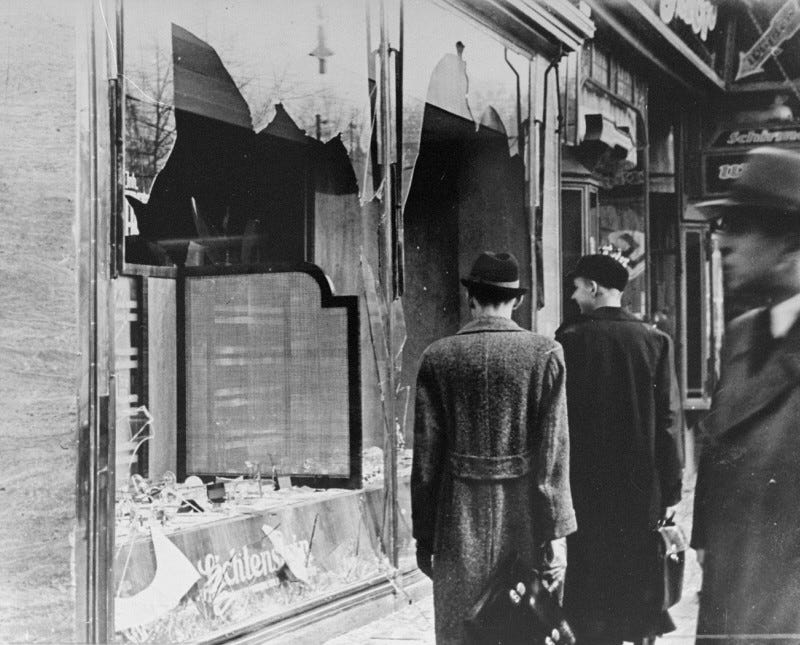The shock of Kristallnacht
American Jews and the Holocaust: Part 2
This is part 2 of an ongoing series. Read part 1.
The antisemitism American Jews feared wasn’t merely in their heads; it was very real. And it wasn’t only about their own well-being, comfort, and position in America that the Jewish community was concerned. Since the early 1920s, nativist sentiments had prevailed in American opinion, and newly-established immigration quotas kept out mainly Eastern and Southern Europeans, while allowing primarily Northern Europeans from the British Isles and Germany to immigrate. These quotas stood as one of the major obstacles to Jewish immigration.

Adolf Hitler had argued that no country wanted the Jews, and the United States wouldn’t prove him wrong. American society had no desire to expand or abolish immigration quotas to allow into the country the persecuted Jews of Europe. Even after the horrifying pogroms of Kristallnacht in November of 1938, when Americans were outraged and tended to sympathize with the Jewish victims of Nazi oppression, American opinion was decidedly against taking concrete action to take in the Jewish victims. A full 77% of polled Americans opposed increasing the immigration quota of German citizens in 1938. The doors would remain closed, just as Americans wanted them.
American Jews, nevertheless, reacted strongly to Kristallnacht. Samuel Margoshes, a writer for the Yiddish newspaper The Day, conveyed the feelings of the Jewish community: “The Jewish masses are waiting to go out into the streets, to close their places of business, to stop all work, to declare a fast and to demonstrate to the entire world that we will no longer allow ourselves to be slaughtered by a barbaric regime.” In Bearing Witness: How America and Its Jews Responded to the Holocaust, Henry Feingold opines that Kristallnacht “may have shocked American Jews more than their German compatriots because they were totally unprepared to believe that the rights of citizenship associated with emancipation could be withdrawn.”
Photo: United States Holocaust Memorial Museum
Better off and more at home in the United States than they had been in Europe, Jews were shaken to learn that even in a supposedly civilized, emancipated society, their rights could be taken away. There was never any lack of sympathy, fear, or outrage by American Jews on behalf of their suffering European brethren. What they lacked, however, was concrete, effective action, and this was generally due to their own views of their place within America. Naturally considering themselves as part of American society after several generations, they had faith in their own country. This was reflected in the newspaper the Forward in the wake of Kristallnacht: “‘America and other countries are not sending refugee aid,’ the Forward explained, ‘because such aid would play into the hands of the Nazis. The Christian world will find a place of refuge for the Jews. We may have trust in the civilized world.’”1 They had confidence that the “civilized world” to which they were loyal wouldn’t let them down; good would triumph over evil, in the end.
The public outrage over Kristallnacht, in fact, infused the American Jewish community with a thread of hope and optimism: it told them that the Jews weren’t alone in the struggle against Nazi Germany. The community’s institutions clung to this hopeful idea. The General Jewish Council—which had been formed as an umbrella group for the American Jewish Congress, B’nai B’rith, and other organizations—issued a resolution on Kristallnacht: “Resolved that it is the present sense of the General Jewish Council that there should be no parades, public demonstrations, or protests by Jews.” This was justified by the explanation that the world’s outpouring of anger and outrage after Kristallnacht brought into sharp relief “an issue which goes far beyond the persecution and torture of a particular minority and that today it is civilization itself that is under attack. All Americans—Protestants, Catholics, and Jews alike—have reacted to these hideous accounts from abroad as a national calamity.”2 By issuing such a statement, the Jewish Council tried to erase the specifically Jewish element of the Nazi persecutions and make it a universal issue.

Certainly, it’s helpful to break down cross-cultural boundaries by recognizing that suffering and persecution are universal human issues about which all people should care, regardless of race or religion. And it was understandable that the Jewish Council desired to ally and thus identify with Christian fellow Americans, emphasizing their common bond as Americans. But the Nazi persecutions were not universal—they were specifically targeting Jewish victims. By refusing to respond to the crisis as Jews, the General Jewish Council denied and diluted the specifically Jewish nature of the crisis in the eyes of the American people. Their desire to define and portray themselves as Americans, and not primarily nor specifically as Jews, would mark the Jewish community’s responses throughout the war.
This is part 2 of a series. Read part 3 here.
Lookstein, Haskel. Were We Our Brothers’ Keepers? The Public Response of American Jews to the Holocaust, 1938-1944. 48.
Lookstein: 59.


